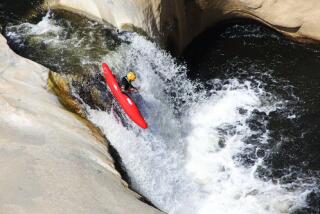American Survives Mountain Ordeal to Get Help for Rafters on Yangtze
- Share via
PEKING — A young American cameraman hiked for five days over a snow-capped, 15,000-foot mountain pass, eating wild plants, to get help for an ill-fated Sino-American rafting expedition stranded and out of radio contact on the treacherous upper stretches of the Yangtze River.
In telephone interviews Thursday and Friday, Paul Sharpe, 30, of Aspen, Colo., said that after one of the expedition’s rubber rafts was damaged on the river, he walked off alone with a single day’s food supply to seek aid for the other 10 members of the group.
“It was five days before I could get to a telephone that worked,” Sharpe told The Times. “It was five days before I got to a road.”
After losing the trail, he said, he was helped by local Tibetans to make his way through one of the most remote, mountainous parts of China, an area where leopards, bears and snakes abound.
All Arrived Safely
Sharpe’s efforts eventually proved successful. On Thursday afternoon, Ken Warren, the 59-year old grandfather of seven and leader of the rafting expedition, and the five other Americans and four Chinese arrived safely in the town of Batang in Sichuan province near the border of Tibet.
But their effort to be the first group ever to navigate the upper reaches of the Yangtze resulted in failure. On Friday, Sharpe confirmed that all the members of the expedition except for himself and Warren were giving up on the Yangtze and going home.
“There’s disappointment on Ken’s part, but for everyone else there’s just relief that they are off the river,” Sharpe said. He said it was possible that Warren and he might try to join a separate Chinese expedition also trying to navigate the upper Yangtze.
Planned Rafting Business
The Sino-American expedition was sponsored by a Chinese group, China Sports Services Co., and by several American organizations, including the National Geographic Society. The aim was to travel down the Yangtze from its source in Qinghai province to Yibin, about 1,900 miles downstream in Sichuan. That section of the world’s third-longest river contains fierce rapids and runs through deep mountain gorges.
Besides adventure, there were commercial aspects to the trip. The team included a television crew for the ABC network under the direction of producer John Wilcox, who had arranged to film a two-hour special on the expedition.
In a letter sent out to equipment suppliers last June, Warren said he had obtained “exclusive rights to assist CSS Co. in developing a major commercial rafting business in China commencing in 1987.” He also told those who supplied equipment to him that there was “potential continued media exposure for your products over a period of several years.”
After the Sino-American expedition began in July, it suffered a series of setbacks. The most serious was on Aug. 3, when one of the cameramen, David Shippee, 29, of Boise, Ida., died, apparently of pneumonia. His body was buried on a promontory along the Tuotuo River, one of the sources of the Yangtze.
A pair of oars and Chinese and American flags were used to mark the grave, a U.S. official in Peking was told. The other cameramen filmed the burial ceremonies.
After Shippee’s death, four other Americans left the expedition to go home. “They were unhappy with the way things were going,” Sharpe said.
Lacked Rescue Copters
From Aspen, Wilcox told The Times that when Shippee died, the other members of the expedition realized how dangerous it was. “The Chinese don’t have the kind of small helicopters used for rescue,” he explained. Wilcox also said that “had Ken (Warren) known David Shippee had pneumonia and asthma, he never would have been on the trip. But Ken never knew that.”
Shippee was not the first casualty of the international rush to navigate the upper Yangtze. Last year, Chinese photographer Yao Maoshu, 32, a Sichuan native who said he had been inspired by Jules Verne adventure stories, tried to raft alone down the river. A Tibetan woman found his body.
This summer, at least two all-Chinese expeditions are also seeking to navigate the upper Yangtze, apparently in competition with Warren’s group. On July 27, two rafts from one of the Chinese expeditions capsized after hitting rocks, and three of the Chinese explorers drowned in the river.
The expedition led by Warren, who heads Ken Warren Outdoors Inc. of Portland, Ore., ran into trouble on the river on Aug. 26, when four of the five rubber boats collided in the roaring, rushing water.
No one fell into the water. But according to a recent Chinese account in the provincial newspaper Sichuan Daily, the four boats were damaged, one of them seriously. The expedition stopped, and three of the boats were repaired. The fourth was considered too badly damaged.
The expedition had been carrying radio equipment with which to call for help, but this, too, was damaged on the river. As a result, Sharpe agreed to go off in search of help.
The Chinese account in the Sichuan Daily maintained that Sharpe could have reached the Sichuan village of Shanyan in only two or three hours. “Unfortunately, he lost his direction halfway there,” it said. “Instead of heading for the township, he climbed the top of a snowy mountain 5,000 meters (16,400 feet) high.”
Finally, he ran into Tibetans who agreed to help him. To communicate with them, he said, “I basically had to use hand signals. I learned a little Tibetan, but not enough.”
Sharpe said that when he left the river he had only a day’s supply of food. While on the trail, he said, “I ate wild plants, and then flour and water the Tibetans gave me, and lots of yak butter.”
Rescue Team Sent
While Sharpe was making his five-day journey from the river to Batang, the land support team for the trip, concerned by the lack of radio contact, had begun to organize a search. According to Wilcox, some Tibetans who passed by the expedition also phoned Peking to report on its need for help.
Sharpe’s arrival in Batang provided the account of what had happened to the expedition and its location on the river. A rescue team, traveling on horseback, went out to find the stranded rafters.
Meanwhile, Warren had separated from the rest of the group and set off on his own in search of help. Eventually, the rescue team found both Warren and the other nine members of the expedition, all of whom were brought back to Batang.
Wilcox, the television producer, said Thursday that negotiations were under way to have some members of the Sino-American expedition join with one of the Chinese teams downriver, thus ending the competition to be first.
“The Chinese have won face,” he said. “They’re already far ahead of the Americans.”
But in Batang, Sharpe indicated Friday that there will be few volunteers.
“All four Chinese in our expedition are quitting,” he said. “The two American boatmen are quitting, the two American cameramen and one soundman are quitting.”
Sharpe said he was willing to go back down the river, and so was Warren, the expedition leader. However, he went on, “no decision has been made.”
More to Read
Sign up for Essential California
The most important California stories and recommendations in your inbox every morning.
You may occasionally receive promotional content from the Los Angeles Times.













